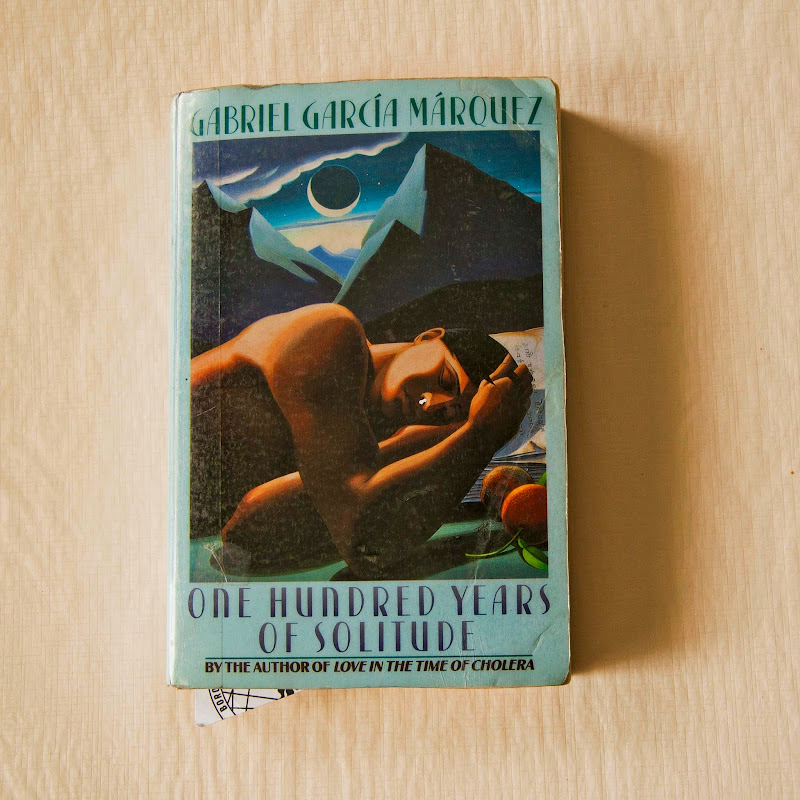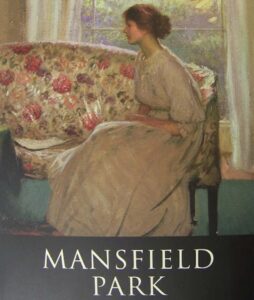Maybe it is a metaphor, I do find it satirical. And I am confused. Not because One Hundred Years of Solitude is complex, but because I feel it is the representation of something else, my guess is humanity and civilization. But I am not sure as to what aspect of our evolution I ought to compare it with. It feels like reading a pop culture novel: you can only really appreciate it if you are well versed in the culture of the time it references. All the same I am enjoying my first reading of Gabriel García Márquez. Right now, my favorite character is Aureliano (who is at present channeling Nabokov’s Humbert Humbert (don’t you just love that name, Hum-Hum?)). But young Arcadio holds promise, too. What with all these foreshadowing of him facing a firing squad. How did he get there? The mud eating girl, Rebeca, is endearing and vicious Amaranta has fangs. Who does not appreciate a girl who threatens to either kill herself or the girl with whom she shares a bond rather than allow the poor mud-eater to marry the ridiculous sod they both have feelings for. But who (the sod) only returns the affections of the older sister. My question here is why are women often so eager to hurt one another over a man? What about the man?
Well, it is all very thrilling how one moment some of these characters are just in the background and
in the next sentence, their stories are front and center. For some unknown reason, I get the feeling that Marquez’s One Hundred (1967) probably influenced George RR Martin’s Game of Thrones (1996). (Ahem, “everyone” is interpreting Martin’s latest reference to The Winds of Winter as a possibility of his finishing the 6th book this year! Here I was thinking it will take about a decade.)
Right, back to One Hundered. So I am very early in my reading. I am on page 77 of 422. At this rate I will be done in forever. But my deadline is the 31st so hopefully I will get my act together. Like I have said, I do not, yet, have a firm grasp of the book. But if it is all the same with you I want to talk about Pilar. Having just finished To the Lighthouse, and seeing how Mr. Ramsey wore out Mrs. Ramsey by selfishly manipulating her into the role of mother (more to himself than to his eight children), friend, lover, wife, housekeeper, daughter, and you name it! I am sensitive to how “everyone” is using Pilar in the very few pages I have read. And is that a pun? Her name? I did a little google search and pilar is the Spanish word for pillar. I cannot see her, this early in my reading, as a pillar of salt so she must be a pillar of support. That is if her name is a pun.
Meeting Pilar for the first time, she is described as “a merry, foul-mouthed, provocative woman,” who “knew how to read the future in cards.” In other words, the woman you fool around with, not the one you marry. Since I have already reached the mindset that all the characters are ridiculous in a most pleasant way, I assume, from the above description, that what separates Pilar from the rest is possibly a sense of humor. Hence merry and provocative. As I have just recently read the Alchemist, for the first time, I am reminded that soothsayers oftentimes hold a special place in narratives. Now, when Pilar tells José Arcadio’s mother that “he’ll be very lucky,” even before she takes out her cards to read his fortune, was I slow to not have seen the sexual connotation? Or am I wrong to now assume that is what was being alluded to? especially after what encountered between them. It is of course very likely too that there is more luck out there waiting for Jose Arcadio. For how many men are able to knock up a woman and flee with another woman? That is a rhetorical question. Please do not mind me. Like I said previously, I am in a very good mood. Unfortunately my sense of humor is a little on the dark side.
Now back to Pilar. One would think that after all she did for the oldest son of Buendía, she would be left alone for a bit. But no. She gives them Arcadio, then she becomes Aureliano’s training ground. Here’s how he does it: after getting drunk for the first time in his life he goes to Pilar’s house and says to her, “I’ve come to sleep with you.” He was not even at his best, “his clothes are smeared with mud and vomit.” I say this is brainwashing. All these ideas of what a good woman is. She has to sleep with many men because she is stronger than them and she can teach them “the way.” But that makes her not good enough to be married to any one man. She is like the sacrificial lamb. Always there for others only. This breaks my heart. If a woman is not like so, then she is unnatural. So Pilar, God bless her, does her job admiringly and lovingly. She becomes for Aureliano the mother and lover he needs. And he gets to unburden himself of all his troubles, which amounted to his passion and obsession with a girl child who is yet to reach puberty. Oh woman! And to this, our dear Pilar says, “You will have to raise her first.” And in so saying, she elicites understanding and encouragement. She then goes on to say “I’m going to talk to the girl…and you’ll see what I’ll serve her on the tray.” And I think et tu, Pilar? It is one thing to sacrifice yourself for these men, and another thing to pimp bring the little girls onto them.
Well I am eager to see how the story goes. If Jose Arcadio Buendía junior has indeed got a ton more luck waiting for him, and what that luck will amounts to. What will happen to little Remedios, will she indeed become Aureliano’s Lolita, albeit legally? Will Rebeca marry her Italian sod, Pietro Crespi? And will Amaranta kill herself or everyone? And how will Arcadio end up facing the firing squad? And will he really resurrect like Melquídas? But above all, how much more of herself will Pilar give before the last word in the novel.
—
Jane



